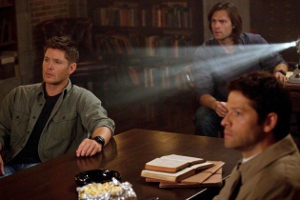Just Another Guy
 Generally I like what Supernatural does with Biblical mythology. Mind you, the writers are only scraping the mythology. They never explore the actual point of this or that story, but only steal from the cultural detritus of a society once Christian, re-purposing folktales they once half-heard in Sunday school.
Generally I like what Supernatural does with Biblical mythology. Mind you, the writers are only scraping the mythology. They never explore the actual point of this or that story, but only steal from the cultural detritus of a society once Christian, re-purposing folktales they once half-heard in Sunday school.
Take, for example, the arc about the Darkness and the Mark of Cain.
Beware! Spoilers follow.
God in Supernatural
Monday, January 23, 2017 8:00 pm

Take, for example, the arc about the Darkness and the Mark of Cain.
Beware! Spoilers follow.
Peekaboo
Added to the Library at Speculative Faith
Sunday, January 15, 2017 2:25 pm
My book The Giant's Walk has been added to the library at Speculative Faith. Click here. For the time being, at least, my book is also showing up (with others) on their front page. I invited myself to their library, but they have been kind enough to let me in. Thank you, Speculative Faith.
Do It Again, Do It Again!
Who Doesn't Like a Series?
Wednesday, January 4, 2017 1:45 pm
There's a lot of advice regarding self-publishing. Much of it involves leveraging Facebook or Twitter or writers' conferences and forums; networking, as it were. I am incompetent at networking. I am generally incompetent at peopling. But one bit of advice I can take is to create a series.
I tend not to make separate works that involve the same characters or worlds. I did write several short stories involving Pugnacious Footefake, but those together barely constitute a single book. The idea, rather, is to offer several related books.
I tend not to make separate works that involve the same characters or worlds. I did write several short stories involving Pugnacious Footefake, but those together barely constitute a single book. The idea, rather, is to offer several related books.
How Quaint Your Tale!
Already a Period Piece?
Sunday, January 1, 2017 1:29 pm
"Aggressively self-promoting" does not describe me. I have made a few bold moves in my writing career (one of which paid off), but I have never been guilty of dogged legwork on my own behalf. My works therefore tend to age, unread.
I have recently retired from my day job. I am still young enough (and not in the self-delusional sense of 60-is-the-new-40) that I now have more than enough time to work a lot harder at getting myself either noticed or traditionally published.
I thought of trying, yet again, to get Noah, Penny published by someone other than myself. Then I reviewed the story in my mind. I realized that it is dated. No cellphones; no texting; no TV on demand; no internet at all. Not one of the characters — all of them in the eighth grade — makes any reference to social media. And how could they? The book was written in the mid-'90s.
I have recently retired from my day job. I am still young enough (and not in the self-delusional sense of 60-is-the-new-40) that I now have more than enough time to work a lot harder at getting myself either noticed or traditionally published.
I thought of trying, yet again, to get Noah, Penny published by someone other than myself. Then I reviewed the story in my mind. I realized that it is dated. No cellphones; no texting; no TV on demand; no internet at all. Not one of the characters — all of them in the eighth grade — makes any reference to social media. And how could they? The book was written in the mid-'90s.
Where Have You Been, Dear David?
I Have Been Elsewhere, Dear Reader
Tuesday, December 27, 2016 1:31 pm
So I resurrected my blog in the spring of 2015. And then, having coded it and deployed it and spun it up with a few entries (some reused from long ago), I disappeared. Isn't that the way?
Now I am back, perhaps to disappear again.
Fickle blogger I be.
Now I am back, perhaps to disappear again.
Fickle blogger I be.
An Inadequate Number of Robots
Hugo Awards 2015 - Short Stories
Sunday, June 14, 2015 10:42 am
I am a voter for the 2015 Hugo Awards. I am posting my thoughts about the candidate works. Be warned that spoilers abound.
There are five short stories on the Hugo list. I'll be referring to them using the following abbreviations.
OSP — On a Spiritual Plain by Lou Antonelli
PBB — The Parliament of Beasts and Birds by John C. Wright
SS — A Single Samurai by Steven Diamond
TT — Totaled by Kary English
TC — Turncoat by Steve Rzasa
My comments on these shorts will be short — and scattered.
There are five short stories on the Hugo list. I'll be referring to them using the following abbreviations.
OSP — On a Spiritual Plain by Lou Antonelli
PBB — The Parliament of Beasts and Birds by John C. Wright
SS — A Single Samurai by Steven Diamond
TT — Totaled by Kary English
TC — Turncoat by Steve Rzasa
My comments on these shorts will be short — and scattered.
The Goblin Emperor
Hugo Awards 2015 - Novel by Katherine Addison
Friday, May 29, 2015 6:59 pm
I am a voter for the 2015 Hugo Awards. I am posting my thoughts about the candidate works. Be warned that spoilers abound.
Maia, the half-goblin and youngest son of the Emperor of the Elflands, banished with his mother from the court, inherits the crown when the Emperor and all other his other sons are killed in an airship accident (which was, in fact, no accident). Maia is not at all prepared and has to find his place.
To begin with, this novel passed one of my standard tests: I never cringed at the dialogue. Sometimes I cringed at what was being said, but never the way it was being said. None of it was cloying or cute. Indeed, none of the writing made me cringe. That may seem like faint praise, but it's not. Addison's style is controlled and effective. She revealed things in a sound order, with a sound pacing. Things followed one another well and I wanted to keep reading. Her fantasy world did not dazzle me and seems a bit conventional (even to me, who doesn't read much fantasy), but it worked.
Maia, the half-goblin and youngest son of the Emperor of the Elflands, banished with his mother from the court, inherits the crown when the Emperor and all other his other sons are killed in an airship accident (which was, in fact, no accident). Maia is not at all prepared and has to find his place.
To begin with, this novel passed one of my standard tests: I never cringed at the dialogue. Sometimes I cringed at what was being said, but never the way it was being said. None of it was cloying or cute. Indeed, none of the writing made me cringe. That may seem like faint praise, but it's not. Addison's style is controlled and effective. She revealed things in a sound order, with a sound pacing. Things followed one another well and I wanted to keep reading. Her fantasy world did not dazzle me and seems a bit conventional (even to me, who doesn't read much fantasy), but it worked.
© 2004-25 David Skinner · All rights reserved
